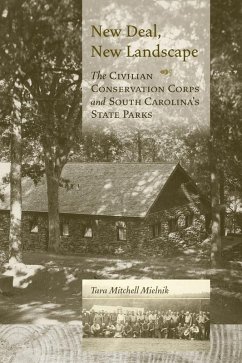Tara Mitchell Mielnik fills a significant gap in the history of the New Deal South by examining the lives of the men of South Carolina's Civilian Conservation Corps (CCC) who from 1933 to 1942 built sixteen state parks, all of which still exist today. Enhanced with revealing interviews with former state CCC members, Mielnik's illustrated account provides a unique exploration into the Great Depression in the Palmetto State and the role that South Carolina's state parks continue to play as architectural legacies of a monumental New Deal program.
In 1933, thousands of unemployed young men and World War I veterans were given the opportunity to work when Emergency Conservation Work (ECW), one of Franklin Delano Roosevelt's New Deal programs, came to South Carolina. Renamed the Civilian Conservation Corps in 1937, the program was responsible for planting millions of trees in reforestation projects, augmenting firefighting activities, stringing much-needed telephone lines for fire prevention throughout the state, and terracing farmland and other soil conservation projects. The most visible legacies of the CCC in South Carolina are many of the state's national forests, recreational areas, and parks.
Prior to the work of the CCC, South Carolina had no state parks, but, from 1933 to 1942, the CCC built sixteen. Mielnik's briskly paced and informative study gives voice to the young men who labored in the South Carolina CCC and honors the legacy of the parks they built and the conservation and public recreation values these sites fostered for modern South Carolina.
In 1933, thousands of unemployed young men and World War I veterans were given the opportunity to work when Emergency Conservation Work (ECW), one of Franklin Delano Roosevelt's New Deal programs, came to South Carolina. Renamed the Civilian Conservation Corps in 1937, the program was responsible for planting millions of trees in reforestation projects, augmenting firefighting activities, stringing much-needed telephone lines for fire prevention throughout the state, and terracing farmland and other soil conservation projects. The most visible legacies of the CCC in South Carolina are many of the state's national forests, recreational areas, and parks.
Prior to the work of the CCC, South Carolina had no state parks, but, from 1933 to 1942, the CCC built sixteen. Mielnik's briskly paced and informative study gives voice to the young men who labored in the South Carolina CCC and honors the legacy of the parks they built and the conservation and public recreation values these sites fostered for modern South Carolina.
Dieser Download kann aus rechtlichen Gründen nur mit Rechnungsadresse in A, D ausgeliefert werden.









